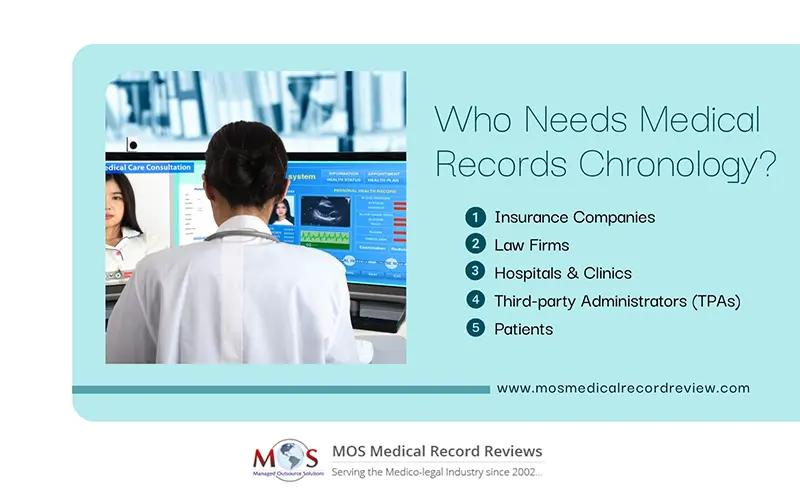The success of health insurance claims relies heavily on a thorough insurance claim review, which ensures all records are accurate, complete, and properly organized.
Over 80% of health insurance claim denials are due to incomplete or disorganized medical documentation. These claims are often put under thorough scrutiny and validation of the claimant’s medical records. However, the claim process can be time-consuming and prone to errors, especially considering the large number of medical records.
In such scenarios, one overlooked aspect plays a vital role that could either make or break a claim—medical records chronology, a key factor in health insurance documentation.
Regardless of whether you are a healthcare provider, legal professional, insurance adjuster, or patient, properly organized medical records are not optional; it’s an inevitable necessity. And when it comes to handling insurance claims, the chronological sequencing of medical events is more than just another formality. It’s the final piece of the puzzle in arranging fragmented health data into a coherent, persuasive narrative.
In this post, we shall explore the vital role medical records chronology plays in healthcare insurance claims processing. We’ll explore its relevance, implications, and how professionals can leverage this tool for higher claim approval rates, reduced turnaround times, and greater operational efficiency.
What Is Medical Records Chronology?
Medical records chronology is the sequential arrangement of the information obtained from a patient’s healthcare records. This can include physician notes, hospital records, diagnostic reports, prescriptions, and follow-ups. Chronology lays out a clear and comprehensive timeline of a patient’s health journey, ranging from symptoms to diagnosis and treatment.
Think of it as the storyboard of a patient’s medical history; only instead of depicting a tale for entertainment, it’s drafted to support medical, legal, and financial decision-making.
Importance of Medical Records in Insurance Approval
When an insurance company receives a health claim, their adjusters and medical examiners will work on the legitimacy and necessity of the treatments listed. This is where chronology becomes a crucial aspect:
- Clarity and Context: Disorganized medical records can lead to confusion and invalid connections. A well-structured chronological medical history offers clear context, displaying the logical sequence of symptoms, diagnosis, and care. It minimizes ambiguity and provides the insurer with a clearer picture of the claim’s validity.
- Reduces Claim Denials: It is common for insurance companies to deny claims due to missing/questionable links in documentation. When there’s a thorough chronology in place, the chances of denial significantly drop, as each piece of medical care is supported and sequenced with valid documentation.
- Accelerates Claim Processing: The average health insurance claim can take several weeks to months for approval. Chronologies speed up this process by enabling reviewers to identify relevant information rapidly. This leads to less time being spent sifting through records, which increases the turnaround times.
- Supports Legal Defense or Litigation: In cases that involve health-related litigation such as personal injury or medical malpractice, chronological records hold the key in building a credible case for defending a claim. They provide a fact-based sequence that can either support or refute allegations.
- Reduces Administrative Burden: Healthcare providers and insurance firms often have to deal with heavy administrative tasks. Medical chronology services free up their internal resources, thereby enabling the staff to focus on tasks that matter, while trained experts will deal with the intricate organization of medical records.
Challenges in Claims without Proper Chronology
Insurance claims that lack a proper medical chronology are prone to several issues:
- Higher Errors and Omissions: Without a clear timeline, it presents a loophole for important details to be overlooked.
- Longer Dispute Resolution Times: Ambiguous medical records can further drag out claim decisions or even lead to lawsuits.
- Increased Operational Costs: Time is money. Any delays and rework that occur due to unorganized records can trigger significant hidden costs.
- Frustrated Stakeholders: Patients, providers, and insurers will all have to go through problems and face dissatisfaction when claims are held up or denied unjustly.
These challenges clearly demonstrate why an effective medical chronology is not just an added benefit, it’s an indispensable asset.
Who Needs Medical Records Chronology?
Chronological medical records are important for:
- Insurance Companies – To streamline claims processing and minimize fraud.
- Law Firms – To build stronger personal injury, medical malpractice, and workers’ compensation cases.
- Hospitals & Clinics – To support internal audits and legal compliance.
- Third-party Administrators (TPAs) – To manage claims more efficiently.
- Patients – To gain better visibility into their own healthcare history, especially during second opinions or continued care.
The MOS Advantage: Why Partner with Us?
At Managed Outsource Solutions (MOS), we provide medical chronology services customized to suit the requirements of insurance companies, law firms, and healthcare providers. With over two decades of experience, we deliver unmatched precision, efficiency, and confidentiality.
Here’s why MOS is the trusted partner for medical chronology:
- Experienced Medical Review Team: Our professionals have strong backgrounds in nursing, medicine, and legal review, and a good understanding of both clinical and claims-based requirements.
- Customized Chronologies: We have the capability to tailor our output based on the client’s unique needs; whether it’s a brief summary for insurance adjusters or a detailed case history for litigation.
- HIPAA-compliant Processes: Data confidentiality is a non-negotiable criterion. And that’s why our services strictly adhere to the HIPAA guidelines to protect patient privacy.
- Quick Turnaround Times: We understand that time is of the essence. So, our scalable team facilitates handling urgent requests without having to compromise on quality.
- Cost-effective Solutions: Not only are our services reasonable, but outsourcing to us significantly reduces internal labor costs, while improving the accuracy and speed of claims.
How Chronology Impacts the Claims Lifecycle
Here’s a closer look into how a well-structured chronology can influence each stage of an insurance claim:
| Stage of Claim | Impact of Medical Records Chronology |
| Submission | Ensures all the required documents and dates are included. |
| Evaluation | Enables fast verification & validation of medical necessity. |
| Adjudication | Helps adjusters apply appropriate policy rules. |
| Final Decision | Reduces uncertainty, aiding fair decisions. |
| Appeals (if any) | Offers a structured case history to support reconsideration. |
With the healthcare and insurance ecosystem growing in size and complexity with each passing day, the accuracy and structure of medical documentation is what would significantly influence the outcome of a claim. Chronological records stand as the ultimate source of truth that bridges the gap between medical necessity and policy terms.
It doesn’t matter if you’re dealing with high-volume insurance claims or a handful of high-stakes litigation cases, investing in professional medical chronology services for insurance claims for insurance claims is not just a support function anymore; it is an inevitable strategic asset.
Accuracy Meets Compliance
Accelerate your insurance claims with MOS medical records chronology services.





